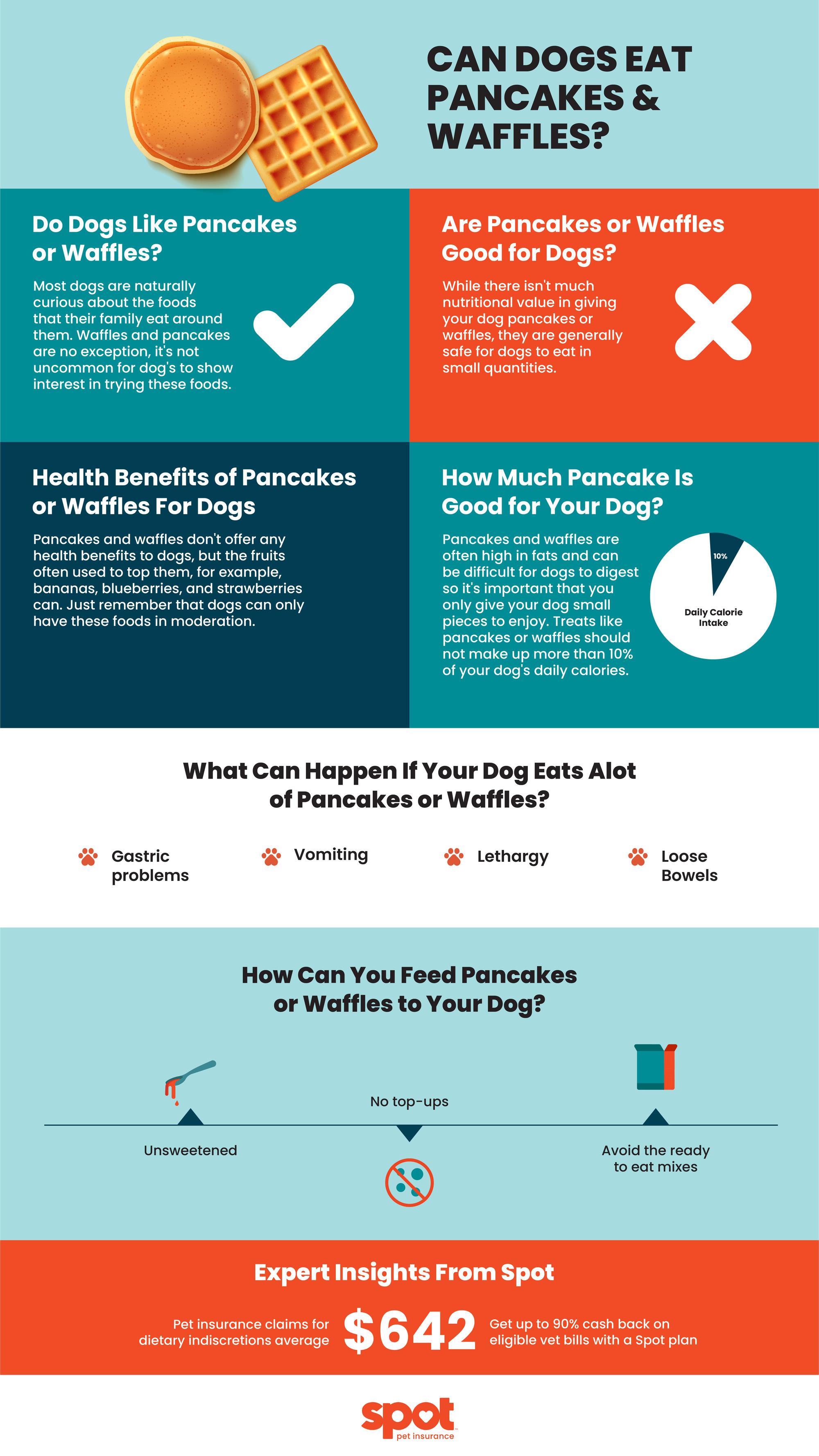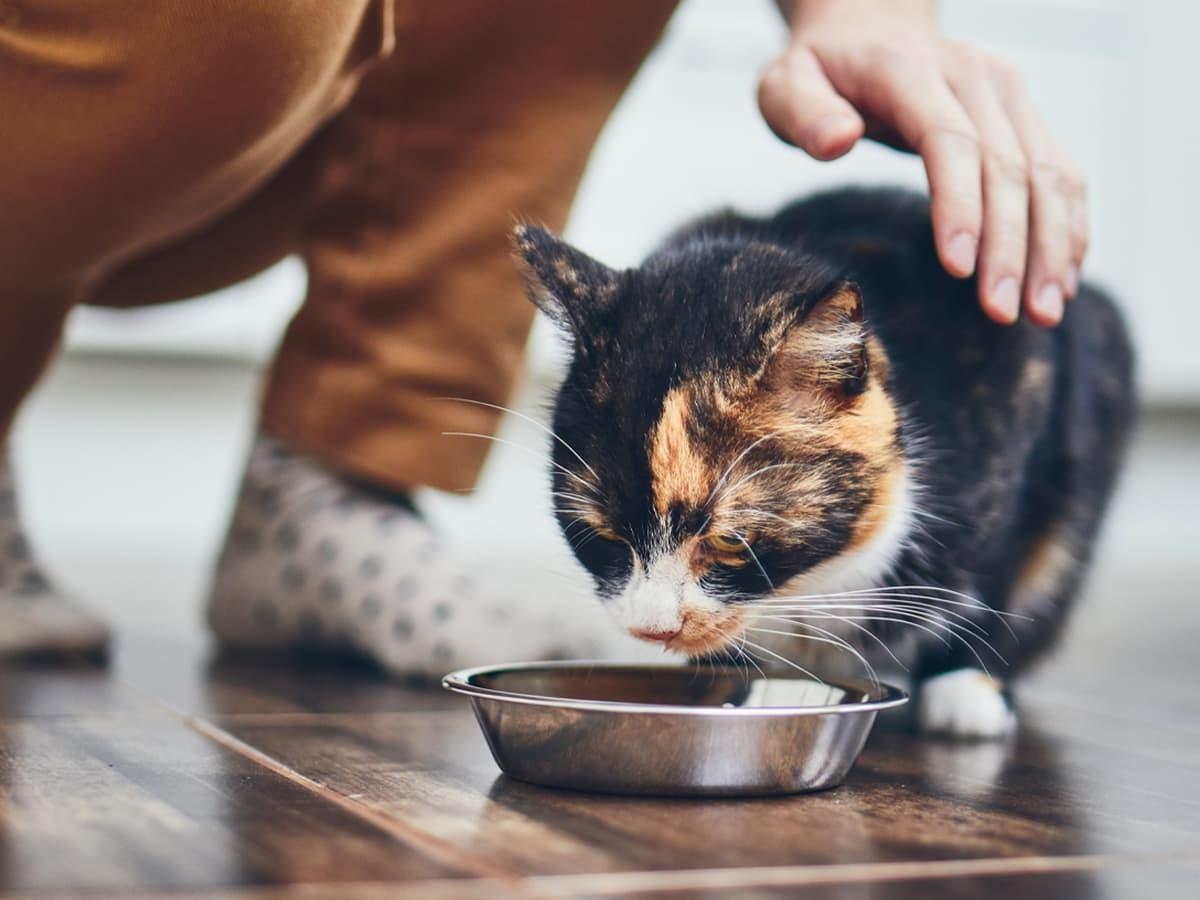Pancakes originated during the times of the ancient Greeks. Though the preparation methods and ingredients may vary, the concept has been around for centuries. Different cultures worldwide boast their versions of pancakes, from 'Cheela' and 'Dosa' in India to 'Buchimgae' in Korea, 'Oyaki' in Japan, and 'Crepe' in South Africa.
Similarly, waffles have a historical lineage dating back to ancient times, with their ancestors being made in 'Wafer irons.' The first written recipe for waffles first emerged in the late 14th century in an anonymous manuscript.3 Today, waffles have evolved into a delectable breakfast and dessert option enjoyed globally in a myriad of flavors.

Can I Give My Cat Some Pancakes? Can I Give My Cat a Waffle?
Pancakes and waffles might be a bit risky to share with a cat because of their sugar content, but generally, they can be safe for feline friends to eat occasionally. However, it's not recommended to make them a regular part of your cat's diet.
Do Cats Like Pancakes and Waffles?
Here's the thing - cats lack the taste receptor protein for tasting sweetness. This is why, if your cat is showing interest in having a bite of your pancake or waffle, it's likely because they are interested in the smell or texture. Another reason could be that your cat is curious about what you're eating. While your cat might sniff at your plate, or accept a bite from you, it's unlikely that they'll enjoy pancakes or waffles as much as we do.
Health Benefits of Pancakes and Waffles
As a staple breakfast item, there must be a few benefits to eating pancakes and waffles for us humans, right? Right! Benefits can include:
Carbohydrates: Pancakes and waffles are primarily a source of carbohydrates, providing energy to kickstart your day.
Protein: The protein content varies depending on the recipe. Adding ingredients like eggs or protein powder can enhance their protein content.
Fiber: When made with whole-wheat flour or oats pancakes and waffles can offer a lot of fiber, aiding in digestion and promoting satiety.
The toppings on the other hand don't have much to offer as far as nutritional benefits. Sugary syrups, butter, and whipped cream can add extra calories and don't add to the nutritional value of your breakfast. Choosing healthier toppings like fresh fruits, nuts, or a drizzle of natural honey can help to make the meal more nutritious. However, cats will not derive the same benefits from eating pancakes or waffles that us humans might.
Are Pancakes Good for Cats?
To delve into the main ingredients of pancakes, namely milk and butter, both are laden with lactose, a component unnecessary for your cat. While not inherently toxic, the sugar and dairy content in these ingredients can pose problems for cats, mainly due to their common lactose intolerance. Waffles share a similar profile. On a positive note, the egg in both waffles and pancakes can offer a valuable source of protein, vitamins, and minerals, including essential taurine for heart health. Eggs also contain antioxidants like lutein and zeaxanthin, which aid in protecting a cat's eyes from damage.1
However, don't start giving your cat pancakes daily, just because you want them to benefit from eating more eggs. The sugar content in both waffles and pancakes should not be overlooked. Excessive sugar or fat intake can result in digestive issues, manifesting as symptoms such as diarrhea or vomiting.2 Moreover, frequent consumption can contribute to unwanted weight gain. If your cat is in this situation, read our article on weight management for pets. Some cats might also harbor allergies or sensitivities to specific pancake ingredients, like wheat flour or dairy.
Are Toppings Safe for Cats?
Common pancake toppings are chocolate chips, maple syrup, and butter. All of these are highly packed in sugar or fat, and should not be on the pieces of pancake you give your cat.
Can Cats Eat Vegan Pancakes?
While the intention might be to do right by your cat, it's not an ideal solution. Opting for vegan pancakes eliminates the issue of milk, but it also removes the sole nutritional element in pancakes – eggs. Unfortunately, the vegan option doesn't offer many, if any, benefits to your cat.1
How Much Pancake is Okay for Your Cat to Eat?
Cats are inherently carnivorous creatures so the bulk of their nutritional needs are fulfilled by eating meat or cat foods formulated to meet their needs. Human foods, including fruits and vegetables, should never make up the majority of a cat's diet. Treats such as pancakes and waffles should be reserved as an occasional indulgence. If you do give your cat a piece of pancake or waffle, limit them to a small bite-sized piece, equivalent to the size of a fingernail.
How Should You Feed Pancakes to Your Cat?
Here are a few tips on how to introduce pancakes to your cat's diet:
Well-cooked: Ensure that the pancakes are thoroughly cooked. Raw dough can pose various digestive issues and lead to complications for your cat.
Avoid fancy additions: Steer clear of adding chocolate, raisins, grapes, or anything containing xylitol, an artificial sweetener. These ingredients are toxic to cats and should never be given to them.
What Should You Do if Your Cat Eats Too Much Pancake or Waffle?
If your cat ends up consuming a substantial amount of pancakes, it can result in the following issues2:
Digestive Issues: The high sugar content in pancakes can lead to digestive upset, manifesting as vomiting, diarrhea, and constipation in your cat.
Obesity: The elevated calorie content in pancakes can contribute to weight gain and, consequently, obesity in your cat. Obesity poses risks of diabetes, heart disease, and joint problems like arthritis.
Elevated Heart Rate: If the pancakes contain chocolate, which often includes caffeine and theobromine, don't share any with your cat. Large quantities of caffeine may lead to an elevated heart rate and potentially trigger a seizure. Additionally, an excessive amount of theobromine can result in poisoning in cats.
Expert Insights from Spot
Sharing snacks with your pet can feel like a sweet way to bond, but their health should always come first. Internal data from Spot Pet Insurance shows that dietary indiscretions cost pet parents an average of $642.* Before offering any new food or treat, talk with your veterinarian to help avoid digestive upset or an unexpected vet visit.
Conclusion
We recommend indulging in your pancakes and waffles occasionally, but it's best to keep them away from your feline friends. Cats won't get any nutritional benefits from these treats that they can't obtain from their regular cat foods. Unlike humans, cats lack sweet taste buds, so they don't experience sugar cravings. If you still wish to share a treat with your cat, ensure it's plain without any toppings, and only give it to them occasionally.

I've had the privilege of immersing myself in the realm of pet safety. As the owner of an energetic mini golden doodle, I know just how stressful being a pet owner can be. I am dedicated to ensuring our beloved pets enjoy a life brimming with good health.
*Jan 2019 to Aug 2024 Spot Pet Insurance Services, LLC claims data.
“Can Cats Eat Pancakes?” Catster, https://www.catster.com/guides/can-cats-eat-pancakes, Nov. 16, 2023.
“Can Cats Eat Pancakes?” Hepper, https://www.hepper.com/can-cats-eat-pancakes, Jan. 3, 2024.
"History of Waffles..." GoFrex, https://gofrex.com/en/history-of-waffles-from-the-middle-ages-to-the-present-day, Sep 22, 2025.
The information presented in this article is for educational and informational purposes only and does not constitute or substitute for the advice of your veterinarian.












